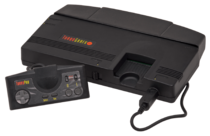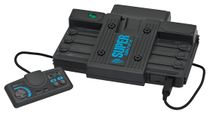PC Engine (TurboGrafx-16) emulators

| |

| |

| |
| Above: The PC Engine. Middle: The TurboGrafx-16. Below: The SuperGrafx. | |
| Developer | NEC, Hudson |
|---|---|
| Type | Home video game console, Handheld game console |
| Generation | Fourth generation |
| Release date | 1987 (PC Engine) 1989 (TurboGrafx-16, SuperGrafx) 1990 (PC Engine GT / TurboExpress) |
| Discontinued | 1994 |
| Introductory price | $199.99 $399.99 (CD Add-On) |
| Successor | PC Engine SuperGrafx, PC-FX |
| Emulated | ✓ |
The PC Engine (PCE) was a 16-bit system released jointly by NEC and Hudson Soft in Japan on October 30, 1987 and in the US on August 29, 1989. It had a Hudson Soft HuC6280 8-bit CPU at 7.16 MHz and 1.79 MHz with 8KB of RAM and 64KB of VRAM. The CPU was teamed up with a 16-bit graphics processor and 16-bit video color encoder chip, both built by Hudson Soft. When it came time to seek other potential markets, the two companies eventually caved to a limited American release in 1989 under a completely different model and name: the TurboGrafx-16. The European versions varied throughout the countries, being the western version in Spain and United Kingdom and Japanese models in Benelux regions.
The joint venture, formed in North America as TTI, made an add-on called the PC Engine CD (PCE-CD) / TurboGrafx-CD (TG-CD) that loaded games from discs instead, much like the Sega CD but better supported. The PC Engine Duo / Turbo-Duo combined the add-on into the unit with more RAM as yet another failed attempt to relaunch the failing console in the West.
When it first launched in North America, the TurboGrafx-16 was largely seen as a failure blamed on poor marketing by the manufacturers. The PC Engine, on the other hand, was a whole different story, beating out the Famicom when it first came out long enough to compete against its rival's own successor and gave little focus for the Mega Drive who was instead posing more of a threat to Nintendo in North America.
NEC planned to enhance the system further, announcing the "PC Engine 2" that would later become the PC Engine SuperGrafx. However, it was rushed to a 1989 market in Japan lacking much of its promised features with only seven titles exclusively made for it, ending up a commercial failure to be binned and discontinued not long after. The PC Engine GT / Turbo-Express was a very rare handheld model of the original hardware, in the same vein as the Sega Nomad (a portable Sega Genesis / Mega Drive). It did include some exclusive features like the TurboLink multiplayer feature (used in games such as the flight sim called Falcon and Bomberman 93) but wasn't widely supported.
Contents
Emulators[edit]
| Name | Platform(s) | Latest Version | PCE2 (SG) |
Peripherals | Retro Achievements[N 1] |
Accuracy | FLOSS | Active | Recommended |
|---|---|---|---|---|---|---|---|---|---|
| PC / x86 | |||||||||
| Mednafen mednafen_supergrafx_libretro mednafen_pce_libretro mednafen_pce_fast_libretro |
1.32.1 libretro cores |
✓ | ✓ | ✓ | Cycle[N 2] | ✓ | ✓ | ✓ | |
| ares | git Artifacts v137 |
✓ | ~ | ✗ | Cycle[N 3] | ✓ | ✓ | ✓ | |
| Mesen | Development Builds | ✓ | ~ | ✗ | High | ✓ | ✓ | ✓ | |
| BizHawk | 2.9.1 | ✓ | ~ | ✓ | Cycle | ✓ | ✓ | ~ | |
| higan (火眼) byuu (謬/view) |
v110 | ✓ | ~ | ✗ | Cycle | ✓ | ✗ | ✗[N 4] | |
| Turbo Engine | 0.32 | ✓ | ? | ✗ | High | ✗ | ✗ | ✗ | |
| MagicEngine | 1.1.3 | ✓ | ? | ✗ | Mid | ✗ | ✗ | ✗ | |
| Ootake (大竹) | 3.04 | ✓ | ? | ✗ | Mid | ✓ | ✓ | ✗ | |
| pcejin (Mednafen 0.8.x) | git | ✓ | ? | ✗ | Mid | ✓ | ✗ | ✗ | |
| DarcNES | 9b0401/9b0313 | ✗ | ? | ✗ | Low | ✓ | ✗ | ✗ | |
| Neco | 0.11 | ✗ | ? | ✗ | Low | ? | ✗ | ✗ | |
| ePCEngine | 12/21/2020 | ✓ | ? | ✗ | ? | ✗ | ✓ | ✗ | |
| FinalBurn Neo | libretro core nightly stable |
✓ | ? | ✓ | ? | NC | ✓ | ✗ | |
| FinalBurn Alpha | 0.2.97.43 | ✓ | ? | ✗ | ? | NC | ✗ | ✗ | |
| Hu-Go! | 2.12 | ? | ? | ✗ | ? | ✓ | ✗ | ✗ | |
| Mobile / ARM | |||||||||
| Mednafen mednafen_supergrafx_libretro mednafen_pce_libretro mednafen_pce_fast_libretro |
libretro cores | ✓ | ✓ | ✓ | Cycle[N 2] | ✓ | ✓ | ✓ | |
| PCE.emu | 1.5.77 1.5.46.02 Pyra git |
✓ | ? | ✗ | Mid | ✓ | ✓ | ✓ | |
| WonderDroid Ultra | 5.5git | ✓ | ? | ✗ | ? | ✓ | ✓ | ✓ | |
| Console | |||||||||
| Mednafen mednafen_supergrafx_libretro mednafen_pce_libretro mednafen_pce_fast_libretro |
libretro | ✓ | ✓ | ✓ | Cycle[N 2] | ✓ | ✓ | ✓ | |
| Virtual Console | N/A | ✓ | ? | ✗ | High | ✗ | ✗ | ✓ | |
| TemperPCE 3DS | git | ✓ | ? | ✗ | Mid | ✓ | ✗ | ✓ | |
| HuGo! GX Unofficial | 2.12.1 | ✓ | ? | ✗ | Mid | ✓ | ✗ | ✓ | |
| PCECast | 06/01/07 | ? | ? | ✗ | Mid | ✗ | ✗ | ✓ | |
| HuE | 0.70 | ~ | ? | ✗ | Mid | ✓ | ✗ | ~ | |
| NitroGrafx | 0.7git | ✗ | ? | ✗ | ? | ✓ | ✗ | ~ | |
- ↑ PC Engine achievements, PC Engine CD achievements
- ↑ 2.0 2.1 2.2 mednafen pce core is Cycle accurate. Another core for PCE system is the "pce_fast" which is an experimental alternative to the pce core. pce_fast is a fork of 0.8.x modified for speed at the expense of unneeded accuracy.
- ↑ As of ares v127, ares developers now provide a new option in the emulator settings: 'Pixel Accuracy'; when this is enabled, any core that supports a pixel accurate mode will use it.
- ↑ Superseded by ares.
Comparisons[edit]
- Mednafen
- Much like its other original cores, it does very well, even having two profiles: "PCE-Accurate" and "PCE-Fast". Despite being CLI-based, a fork of an older version that has a GUI has emerged called pcejin. RetroArch uses the PCE-Accurate and PCE-Fast cores for its beetle fork.
- Mesen
- After a discontinuation of both Mesen and Mesen S, SourMesen resumed developement of both in 2023 and combines them into a single Mesen. The re-release of Mesen also brought emulation of PC-Engine, SuperGrafx and CD-ROM²/TG-CD
- BizHawk
- Uses "Nymashock" core for PCE emulation (ported from mednafen to Bizhawk by zeromus).
- Ootake
- It's okay for general purposes.
- MAME
- Has a
pcedriver (and a child driver calledtg16). In all revisions it emulates, MAME reports it as working and the graphics as okay, but the sound is imperfect. - MagicEngine
- Unfortunately trialware that costs €15 euro. There are better options available for free.
- NitroGrafx
- Is a DS TurboGrafx emulator for Nintendo DS. It is included with TWiLight Menu++.
Peripherals[edit]
| Name | Mednafen | ares | Mesen | BizHawk | Higan |
|---|---|---|---|---|---|
| PCE-CD (TG-CD) | ✓ | ✓ | ✓ | ✓ | ~ |
| GE-CD | ✓ | ✓ | ✗ | ? | ✗ |
| Arcade Card | ✓ | ? | ? | ? | ? |
PCE-CD[edit]
SuperGrafx is also compatible with the CD-ROM² and Super CD-ROM² System add-ons, allowing it to play any CD-ROM² format game with the required System Card. No SuperGrafx-specific CD-ROM² titles were produced. The addition of the CD-ROM peripheral adds CD-DA sound (Audio CDs), and a single ADPCM channel to the existing sound capabilities of the PC Engine.[1]
- See this dedicated page for more information about home media playback support for emulation softwares.
- See Ripping_games.
GE-CD[edit]
Games Express CD Card, Bootleg System Card. This was released by Hacker International for play of unlicensed Games Express CD games. The GECD Card is essentially a dongle; a BIOS v3.00 based machine (like a Duo or a Super CD-ROM²) is required for running those games.
Arcade Card[edit]
On March 12, 1994, NEC introduced a third upgrade known as the Arcade Card, which increases the amount of onboard RAM of the Super CD-ROM² System to 2MB. This upgrade was released in two models: the Arcade Card Duo, designed for PC Engine consoles already equipped with the Super CD-ROM² System, and the Arcade Card Pro, a model for the original CD-ROM² System that combines the functionalities of the Super System Card and Arcade Card Duo into one.[2]
Emulation issues[edit]
Color palette[edit]
The color palettes generated by the PC Engine for Composite and RGB actually differ due to its own color tables being non-linear. This can result in colors ending up looking wrong or blended when the system is emulated or played in RGB. A composite palette was eventually made mathematically and with some extra tweaks from the PC Engine's RGB to YUV lookup table after its HuC6270 video chip had been decapped. This palette is used by default in the PC Engine core for the MiSTer[1]. It can be downloaded for use in other emulators and devices.
